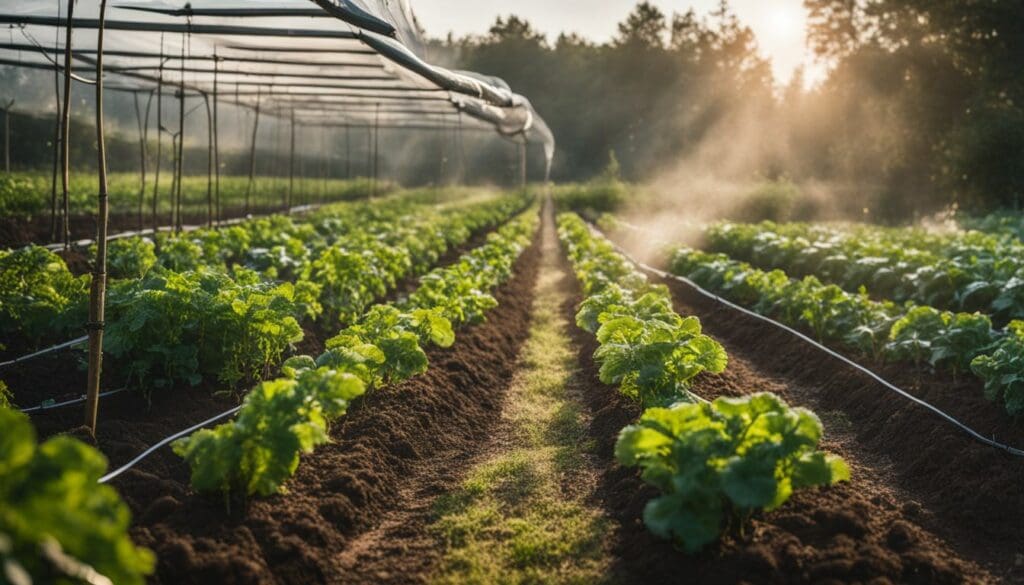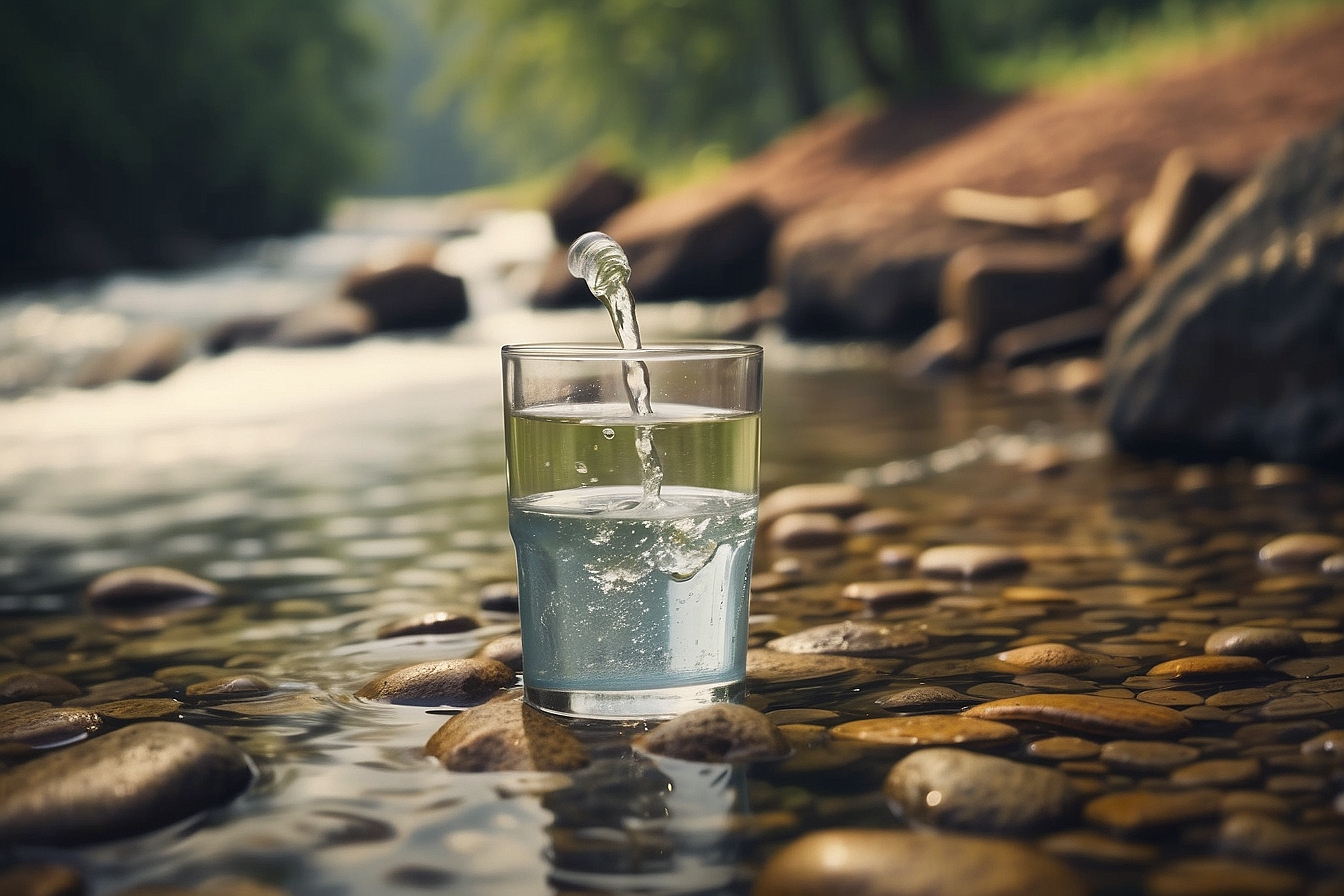Water is an invaluable treasure, and within the realm of farming, judiciously wielding it is becoming ever more pressing. We’re no strangers to this battle; we’ve witnessed the challenges with our own eyes.
Agriculture guzzles a staggering 70% of our globe’s accessible freshwater resources. Our inquiries have led us to unearth practical solutions for safeguarding this indispensable element of life.
Let’s embark on this journey towards water conservation together – because truly, each drop is precious!
Key Takeaways
- Drip irrigation, rainwater harvesting, and using drought-resistant crops are effective strategies for conserving water in agriculture.
- Soil management techniques like composting, mulching, and cover cropping help retain soil moisture and reduce the need for irrigation.
- Advancements such as precision irrigation systems, genetic engineering of drought-resistant varieties, and smart technologies show promise for future water conservation efforts in farming.
- Rotational grazing and other livestock management practices can improve pasture health and increase water retention in soil.
- Integrating innovative methods like subsurface irrigation, gravity drip buckets, laser field levelling into farm operations aids in efficient use of water resources.
The Importance of Water Conservation in Agriculture
We recognise the critical role that water plays in agriculture. It’s not merely about keeping crops hydrated; it’s essential for all stages of food production, from irrigation to processing.
Conserving this precious resource ensures that future generations can continue farming even as our climate changes and water becomes scarcer.
Our approach to sustainable farming hinges on efficient use of every drop. Utilising waterefficient farming practices like drip irrigation and rainwater harvesting safeguards our rivers, lakes, and aquifers from depletion.
Farmers gain numerous benefits by adopting these techniques – they save money, enhance crop yields, and contribute to a healthier ecosystem. Through careful management of this vital resource, we support both agricultural sustainability and global food security.
Water Management Techniques in Agriculture
One of the most effective water management techniques in agriculture is drip irrigation, which delivers small amounts of water directly to the base of plants. Collecting and storing water for later use is also crucial for sustainable farming practices.
Additionally, implementing irrigation scheduling and using drought-resistant crops can significantly contribute to water conservation in agriculture.
Drip irrigation
Drip irrigation provides a targeted and efficient way to deliver water directly to the roots of plants, minimising wastage. This method helps conserve water by reducing evaporation and runoff, while also preventing weed growth.
By using drip irrigation, farmers can ensure that crops receive just the right amount of moisture they need without overwatering. This technique promotes sustainable water use in agriculture and contributes to soil moisture conservation, which is crucial in areas facing water scarcity.
Implementing drip irrigation systems allows for precise control over the amount of water delivered to each plant, promoting farm water conservation strategies. It also supports crop diversification by enabling farmers to cultivate a variety of plants with different watering needs in the same area efficiently.
Collecting and storing water
Transitioning from efficient drip irrigation to the crucial aspect of collecting and storing water, rainwater harvesting is a sustainable practice that holds immense potential in agriculture.
Harnessing rainfall by using catchment systems such as reservoirs and tanks optimises natural resources for crop irrigation. Additionally, implementing runoff capture methods can divert excess water into storage facilities, providing a vital source for agricultural needs during dry periods.
Implementing rainwater collection measures enhances the sustainability of water usage in farming while reducing reliance on external sources. Creating innovative strategies for collecting and storing water can significantly contribute towards achieving long-term environmental conservation goals while ensuring a consistent supply for agricultural activities.
Irrigation scheduling
Transitioning to irrigation scheduling, this technique involves strategically timing and regulating the application of water to crops. By aligning watering schedules with plant needs and weather conditions, farmers can optimise water use while promoting healthy crop growth.
Implementing a well-planned irrigation schedule not only conserves water but also minimises the risk of overwatering or underwatering crops, ultimately leading to improved agricultural sustainability.
Effective irrigation scheduling requires monitoring soil moisture levels and considering factors such as crop type, stage of growth, and environmental conditions. By incorporating advanced technologies and data-driven insights, farmers can accurately tailor their watering schedules for maximum efficiency.
Use of drought-resistant crops
Transitioning from irrigation scheduling, another effective water conservation technique in agriculture is the use of drought-resistant crops. These crops are specifically developed to withstand periods of low water availability, making them ideal for regions prone to drought or limited water resources.
By incorporating these hardy plants into agricultural practices, farmers can reduce their reliance on irrigation and help conserve precious water resources while maintaining crop yields.
Additionally, employing drought-resistant crops contributes to the sustainability of agricultural ecosystems and ensures food security in areas susceptible to water scarcity.
Dry farming
Dry farming involves growing crops without irrigation in regions with limited water availability. This method relies on moisture retention in the soil from winter rains, and it requires selecting drought-resistant crops that can survive with minimal water.
Farmers practising dry farming use techniques like deep ploughing to trap more rainwater in the soil and intercropping to maximise land use without depleting water resources.
Adopting dry farming can help reduce reliance on irrigation, conserving water resources for sustainable agricultural practices. It also promotes biodiversity by encouraging the cultivation of native, drought-tolerant plant species.
Transitioning to dry farming methods offers a promising pathway towards achieving agriculture sustainability in arid regions while promoting efficient crop water management techniques.
Rotational grazing
Rotational grazing involves moving livestock through a series of paddocks in a planned sequence. This method allows pastures to rest and recover, promoting healthier soil and better water retention.
As the livestock move from one area to another, they avoid overgrazing, which can lead to soil erosion and reduced water infiltration. By carefully managing the movement of animals, rotational grazing helps maintain vegetation cover, prevents runoff, and effectively utilises available water resources for sustainable agricultural practices.
Implementing rotational grazing not only benefits soil health but also supports biodiversity while conserving water resources. Livestock are strategically rotated across different areas on the farm or pastureland to promote even forage growth and minimise environmental impact.
Soil Management Techniques for Water Conservation
Using composting and mulching, conservation tillage, cover crops, and organic farming can improve soil health and water retention in agriculture. Read on to discover more about sustainable soil management techniques for water conservation in agriculture.
Composting and mulching
Composting and mulching are essential soil management techniques that help to conserve water in agriculture. Composting involves decomposing organic material, such as kitchen waste and yard trimmings, into nutrient-rich compost, which can then be added to the soil to improve water retention.
Mulching, on the other hand, involves covering the soil with materials like straw or wood chips to reduce evaporation and maintain moisture levels. Both practices not only enhance soil health but also minimise the need for frequent watering, promoting sustainable water resources for farming.
Implementing composting and mulching in agricultural practices significantly contributes to water efficiency by reducing the reliance on irrigation while promoting natural processes for maintaining moisture in the soil.
Conservation tillage
Conservation tillage is a method that reduces soil disturbance by leaving crop residues on the field after harvest. This helps to protect soil from erosion, conserve moisture, and improve organic matter content.
By minimising soil disruption, conservation tillage promotes water infiltration and retention in the soil, which is crucial for sustainable agriculture. Additionally, this technique also contributes to reducing greenhouse gas emissions and promoting biodiversity.
Conservation tillage offers several benefits such as reduced fuel consumption due to less frequent tilling, improved soil structure and health, and decreased erosion. Farmers adopting conservation tillage are actively contributing to water conservation efforts in agriculture while simultaneously enhancing the overall sustainability of their farming practices.
Cover crops
Cover crops are an essential part of sustainable water management in agriculture. They help to reduce soil erosion, improve soil fertility, and retain moisture. This practice not only assists in water conservation but also contributes to the overall health of the ecosystem.
By planting cover crops, we can minimise water runoff and enhance the retention of rainwater in the soil, promoting efficient use of natural resources.
Including cover crops in our agricultural practices is a proactive step towards supporting water conservation efforts. These green manure crops play a crucial role in maintaining soil structure and reducing water loss through evaporation.
Organic farming
Moving from cover crops to organic farming, it’s important to highlight the benefits of this sustainable agricultural practice. Organic farming promotes water conservation by using natural fertilisers and pest control methods that minimise runoff and soil erosion.
This approach also encourages healthy soil microbiology, which enhances water retention and reduces the need for irrigation. By avoiding synthetic chemicals, organic farmers protect water quality in surrounding ecosystems, ensuring a more sustainable future for agriculture.
Organic farming offers environmentally conscious individuals an opportunity to support agricultural practices that prioritise water conservation and ecosystem health. The focus on natural solutions not only minimises environmental impact but also contributes to producing nutritious food while safeguarding our planet’s precious water resources.
Plant and Livestock Management Techniques for Water Conservation
Efficient watering times are essential for reducing water waste in agriculture. Laser field leveling and tailwater reuse are also effective strategies to conserve water on farms.
Efficient watering times
To ensure efficient watering times, consider adjusting irrigation schedules to coincide with cooler parts of the day. This strategy helps reduce water loss due to evaporation, ensuring that plants receive the most benefit from each watering session.
By utilising this technique, we can maximise the effectiveness of our agricultural water management efforts while minimising waste and promoting sustainable practices across our farming operations.
In addition, employing moisture sensors can provide real-time data on soil moisture levels allowing for precise and targeted irrigation, avoiding unnecessary water usage. Such methods align with our commitment to conservation and environmental responsibility in agriculture.
Laser field levelling
Laser field levelling is a modern technique that helps in shaping the land’s surface with precision. It ensures that the field has an even slope, which prevents water from pooling and promotes uniform water distribution during irrigation.
This technology allows for efficient use of water by reducing runoff and increasing water infiltration, making it a crucial method for sustainable agricultural practices.
By employing laser field levelling, farmers can conserve water and enhance soil moisture retention without compromising on crop yield. The technique minimises erosion while optimising irrigation efficiency, contributing to overall water conservation efforts in agriculture.
Tailwater reuse
Tailwater reuse is a sustainable agricultural practice that involves collecting and reusing water runoff from fields for irrigation. By capturing and recycling tailwater, farmers can reduce their reliance on freshwater sources and minimise environmental impact.
This technique also helps to conserve water resources while maintaining soil moisture levels, making it an efficient strategy for environmentally conscious individuals looking to support agricultural water management.
Implementing tailwater reuse not only reduces the demand for fresh water but also minimises the risk of soil erosion and nutrient loss. Using this method can be beneficial in supporting conservation efforts and promoting sustainable farming practices, contributing to a more resilient agricultural ecosystem.
Subsurface irrigation
Subsurface irrigation delivers water directly to the plant roots, minimising evaporation and reducing water waste. This method involves placing tubing or drip lines below the soil surface, allowing for more efficient water delivery to crops.
By targeting the root zone, subsurface irrigation ensures that plants receive water where they need it most, promoting healthier growth while conserving water resources in agricultural settings.
This technique supports efficient irrigation methods and aids in agricultural water management by decreasing runoff and minimising soil erosion. Subsurface irrigation also aligns with rainwater harvesting in agricultural practices, helping farmers make the most of available resources and reduce their overall reliance on external sources of water.
Mulching or using black plastic
Mulching or using black plastic is an effective way to conserve water in agriculture. Mulch helps to retain soil moisture by reducing evaporation, suppressing weed growth, and moderating soil temperature.
This technique also improves soil structure and fertility, which aids plants in accessing water and nutrients efficiently.
Black plastic mulch has the added benefit of increasing soil temperature, promoting early plant growth, and preventing weed competition. It also prevents excessive moisture loss through evaporation while maintaining a favourable growing environment for crops.
Gravity drip buckets
Gravity drip buckets are a simple and effective way to conserve water in agriculture. These buckets utilise the force of gravity to slowly release water onto crops, ensuring that the plants receive a consistent and efficient supply without wastage.
By placing these buckets strategically throughout fields, farmers can maximise their water usage and reduce overall consumption, making it an essential technique for sustainable agriculture.
Using gravity drip buckets not only promotes water conservation but also contributes to healthier crop growth by providing steady hydration directly to the roots. This method is particularly beneficial in areas where traditional irrigation systems may not be feasible or cost-effective, offering an accessible solution for small-scale farming while promoting environmental stewardship within agricultural practices.
The Future of Water Conservation in Agriculture
The future of water conservation in agriculture looks promising with advancements in technology and research. Innovations such as precision irrigation systems, moisture sensors, and data-driven decision-making tools will play a crucial role in optimising water use on farms.
Additionally, the development of drought-resistant crop varieties through genetic engineering holds great potential for reducing the agricultural sector’s water consumption. As awareness about sustainable practices grows, we can expect to see increased adoption of regenerative farming techniques that focus on improving soil health and increasing water retention capacity.
Collaboration between farmers, researchers, and policymakers will lead to more effective strategies for managing water resources in agriculture while maintaining productivity.
Efforts towards sustainable agriculture are expected to drive the implementation of smart irrigation technologies that respond dynamically to weather conditions and plant needs. Furthermore, ongoing research into innovative water-saving techniques like vertical farming and hydroponics is likely to revolutionise how crops are cultivated with minimal water usage.
It is exciting to envision a future where cutting-edge practices ensure efficient agricultural production while safeguarding precious freshwater resources for generations to come.
Conclusion
In conclusion, water conservation techniques in agriculture are crucial for sustainable farming practices. Using methods such as drip irrigation and collecting rainwater can significantly reduce water wastage.
Implementing soil management techniques like composting and conservation tillage promotes water retention in the soil. Additionally, efficient plant and livestock management techniques, such as laser field leveling and subsurface irrigation, contribute to overall water conservation efforts.
These practices not only benefit the environment but also help ensure a more secure future for agricultural production.
FAQs
1. What are water conservation techniques in agriculture?
Water conservation techniques in agriculture include various methods, such as efficient irrigation management and adopting agricultural water management strategies to save water.
2. Why is it important for farmers to manage their irrigation systems?
Managing irrigation systems properly helps farmers use water more efficiently, ensuring crops receive the right amount of moisture without wasting this precious resource.
3. Can you list some agricultural water management techniques?
Yes, farmers can use drip or sprinkler irrigation, check soil moisture levels regularly, and plant drought-resistant crop varieties as part of their water management plan.
4. How does better irrigation management benefit the environment?
Better irrigation management means using less water for growing crops which conserves this vital natural resource and reduces the impact on local ecosystems.





